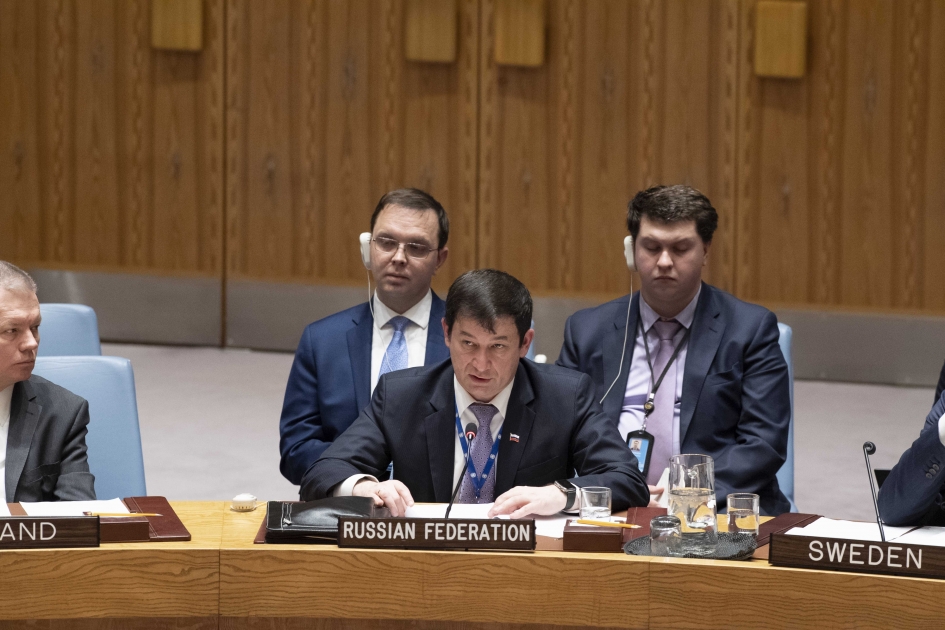Statement by Mr.Dmitry Polyanskiy, First Deputy Permanent Representative of the Russian Federation to the United Nations, at the Security Council on the situation in Haiti
We thank Ms. Helen La Lime, Special Representative of the Secretary-General, for her briefing on the situation in Haiti and the work of the United Nations Mission for Justice Support in Haiti.
In our view, the second of the series of quarterly reports (S/2018/1059) mandated by resolution 2410 (2018) is a remarkably objective reflection of a complex situation in a critical period for the country. The closer we get to the time when the Council must consider the issue of the Mission’s closure, the more frequently Haiti and its people are encountering challenges that they will soon have to deal with by themselves and take national ownership of. The already very fragile security situation has been subjected to new stresses.
The mass protests, which reached a peak on 17 October and again on 18 November, emphasized that resolving any of the issues between the people and the Government must be done through direct, constructive and, most importantly, peaceful dialogue, and strictly within the framework of Haiti’s legal arena. We believe that its citizens’ inalienable right to peaceful assembly and freedom of expression must be exercised solely in compliance with their national legislation.
We support our colleagues who have urged the demonstrators to respect the law and refrain from violence or action that undermines Haiti’s stability and social order. We hope that our Security Council partners will take a similar position on all such situations, wherever they may happen to take place.
We are pleased with the report’s positive assessment of the process of transferring responsibility to the Haitian National Police. We were interested in the description of the fact that the work of dealing with the mass protests enabled the police to display the professional skills they have gained. While those complimentary assessments give rise to optimism, we were surprised that the report made reference in that regard to some so-called international stakeholders who remain nameless.
We would like to see the SecretaryGeneral’s own assessments in his reports, based on information provided by the Mission. We cannot ignore a statement in the section of the report on human rights to the effect that during the reporting period the Mission cited 15 violations allegedly committed by the police. In every instance, for example in paragraph 56, there are references to allegations of the excessive use of force by police officers.
We want to stress that this wording is too vague for a report on an issue as critical as human rights. We would like to point out that in April (see S/PV.8226), our American colleagues insisted that resolution 2410 (2018) should apply the provisions of Chapter VII of the Charter of the United Nations to the Mission’s entire mandate, which undermined the Council’s long-standing consensus on Haiti. Was that really done so that we now have to discuss certain proposals? We are extremely alarmed by the report’s assessments of the rapidly deteriorating economic and humanitarian situation.
The plight of a significant part of the population is being compounded by continuing outbreaks of cholera, while only 11 per cent of this year’s humanitarian response plan has been funded. On top of that, the earthquake that occurred on 6 October resulted in 18 deaths and has either destroyed or damaged around 11,000 homes. In these exceedingly difficult circumstances, the Government, led by President Jovenel Moïse, has made serious efforts to make progress in accordance with the Secretary-General’s benchmarks, including in the areas of political reform, security, the strengthening of the judicial system and, of course, the police.
However, we believe that it is crucial to ensure that the legislative, executive and judicial branches of the authorities work together. Needless to say, neither can the international community remain indifferent. It must help the Government and the people of Haiti to establish their national ownership of post-conflict peacebuilding. The United Nations staff still have a great deal to do in their task of providing the Haitian authorities with as much assistance as possible.
Russia supports Port-au-Prince and will continue to work to ensure that the Security Council’s efforts will result in genuinely normalizing the situation in Haiti and strengthening its sovereignty and self-sufficiency
